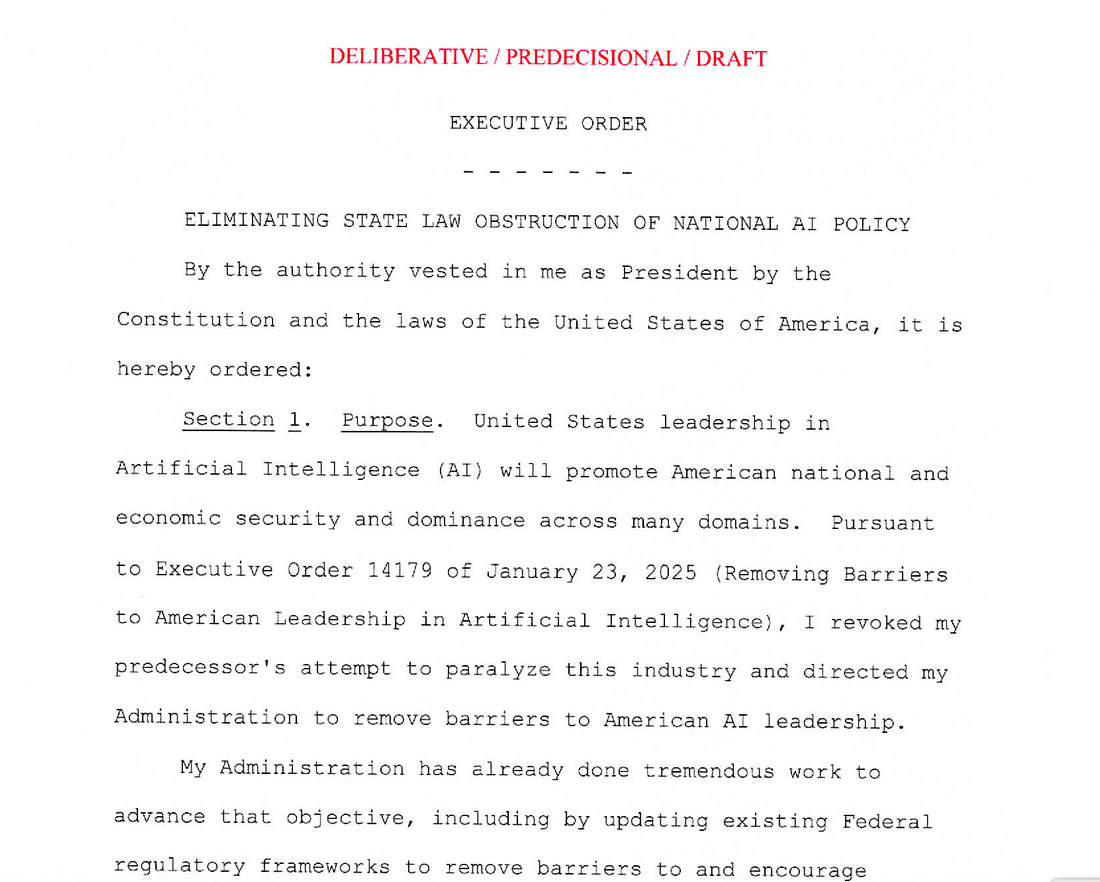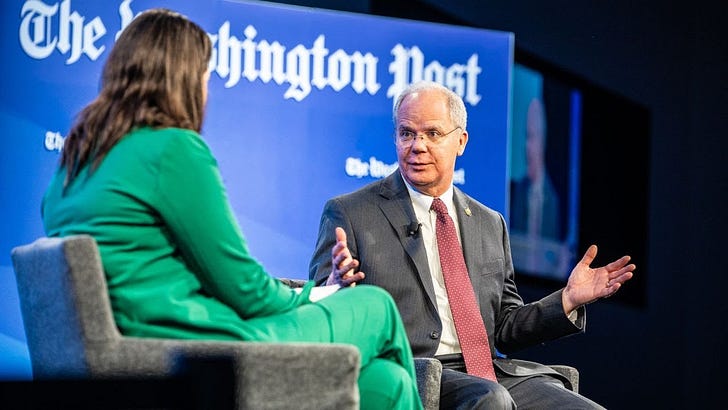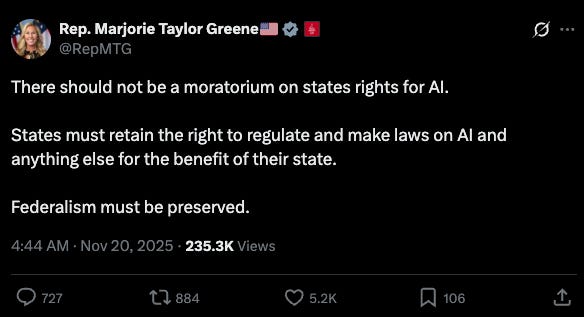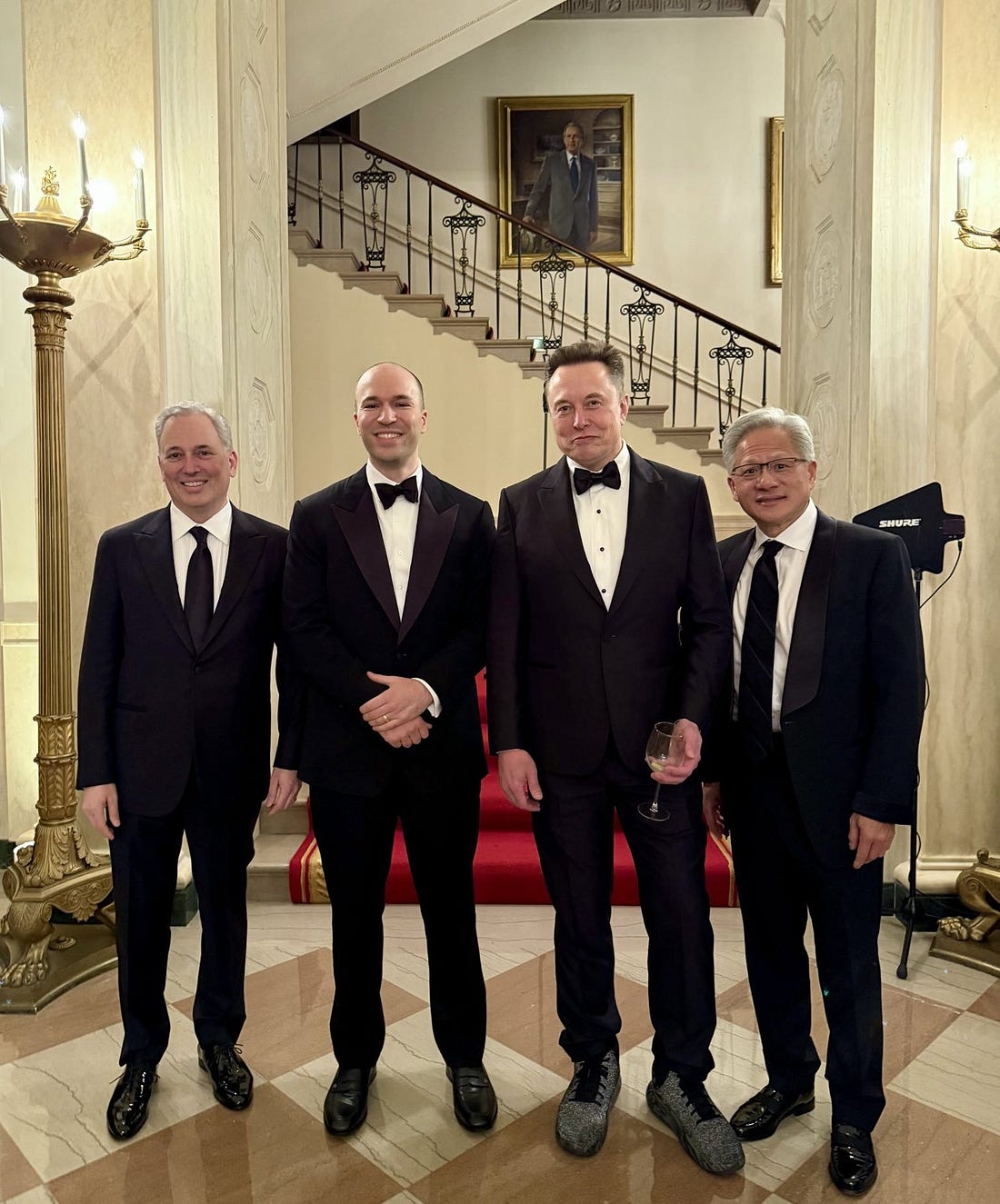Trump and big tech take two more stabs at ending AI democracyThe plot to ban AI lawmaking in the US is back on two separate fronts, and the tech oligarchy is all-in.Big tech’s ploy to halt state-level AI lawmaking is back. Silicon Valley’s allies in the Trump administration are pushing legislators to jam language that would prevent states from passing AI laws into the (otherwise unrelated) national defense authorization bill, and the president has drafted an executive order with the aim, as its title declares, of “ELIMINATING STATE LAW OBSTRUCTION OF NATIONAL AI POLICY.” The proposed EO, which leaked this week, would create a framework for penalizing US states that pass, or have already passed AI laws, mostly by threatening litigation and the withholding of federal broadband funds. It would also serve to concentrate power in the hands of Trump’s AI and Crypto Czar, the venture capitalist and PayPal mafioso David Sacks—further fusing the Trump administration to Silicon Valley’s executive leadership, and entrenching a modern tech oligarchy. Before we get to it, a quick note that this work is made possible by readers who chip in $6 a month—an amount equivalent to a decent latte or beer'—or $60 a year. I’m able to keep the vast majority of this reporting and writing free and open to all thanks to you god-tier humans who are paid supporters. If you’re a regular reader, and you’re able, consider joining them so I can continue to do this work. Many thanks, and hammers up. Readers of this website knew it would only be a matter of time before this push to roll back state AI laws was renewed. After all, earlier this year, with its key allies firmly embedded in the Trump administration, major Silicon Valley AI companies undertook a hard lobbying push to pass a ban on state level AI legislation in the omnibus budget bill. That effort was documented in detail in these pages, and it ultimately came up just short; as in *one* vote short, when Tennessee senator Marsha Blackburn voted nay on the amendment to protect her state’s regulation of AI in the Nashville music industry. The new effort is once again premised on sliding language stopping state level AI lawmaking into an unrelated bill, which should give you an idea of just how unpopular and contentious this all is (even within the GOP caucus, more on that in a second). Here’s Bloomberg:
This is seen as the GOP’s last chance this year to get a bill like this across the finish line, and perhaps their best chance period, as next year begins a Congressional election cycle that will politically complicate the vote. This remains, after all, a remarkably and unambiguously antidemocratic project, one that’s anathema to the spirit of federalism many Republicans claim to cherish. Which is, in fact, why there is vocal opposition from figures like Marjorie Taylor Greene and Mike Davis. “There will be a tremendous conservative grassroots backlash against Republicans who sell out their constituents to help big tech,” GOP congressman and Trump ally Mike Davis told Bloomberg. “If big tech wants federal preemption, they need to protect the four C’s: conservatives, children, communities and creators. Otherwise, this is simply AI amnesty.” In other words, the state AI law ban taking shape is ominous and darkly reflective of this technopolitical moment, but its path to passage is far from assured. Still, given that the last go round came down to a single vote, and surely Blackburn’s now-more-prepared colleagues can promise her some pork/exemptions, I wouldn’t bet against it.
As for the executive order, which you can read in full at the link above, it continues the Trump admin’s designation of AI as a concern of national security first and foremost (“our national security demands that we win this race”) and proceeds on those grounds. Once again, the arch goal is not economic prosperity, or jobs, or even innovation—it’s dominance. “It is the policy of the United States to sustain and enhance America‘s global AI dominance through a minimally burdensome, uniform national policy framework for AI,” as the EO puts it. From there, the EO chiefly does three things:
In short, since executive orders are legally limited in what they can actually do, this essentially serves as official notice that the Trump administration, taking marching orders direct from Silicon Valley VCs and AI executives, will sue, pester, penalize, and attempt to withhold funding wherever possible if states pass AI laws. It’s intended to induce a chilling effect, in other words. It’s not clear how well it will work. Plenty of blue state lawmakers may relish the chance to challenge Trump as his administration tries to meddle in the democratic process, especially in an arena as inflammatory as AI. What remains notable to me about all of this is how willing Silicon Valley elites are to *openly* engage in this agenda. On the vibe front, we’ve gone from “we’re the key allies of Obama’s hope and change project” to “we’ll publicly ally with Trump to stymie the democratic process if it saves us from complying with a few regulations” in less than a generation. There’s little need for aspirational messaging anymore, not when Silicon Valley enjoys such direct access to the levers of power. To that end, little underscores the status of this new nexus better than the fact that the same week that Trumpworld made public its plans to help the tech industry clear out the regulatory weeds, oh half of the beneficiaries of that effort were all at the White House attending a dinner for the Saudi Crown Prince Mohammed bin Salman. That’s Trump’s AI czar and noted VC David Sacks, OpenAI’s Greg Brockman, Elon Musk, and Nvidia CEO Jensen Huang, at the White House this week, for the Saudi investment forum. In context of the EO described above, perhaps it serves as a handy visual cue. Let’s say California passes a law that says you can’t use AI tools to, I don’t know, automate a hiring process unless they’re shown to be nondiscriminatory. (That’s just hypothetical because Gavin Newsom vetoed the one that did that, anyway.) Brockman or Musk might turn to Sacks and say, hey, OpenAI and XAI have enterprise products that do that, and everyone knows nondiscriminatory is code for ‘woke’, can you have the AI Litigation Task Force take a look at that? And thus these guys have their very own (again, dubiously efficacious) framework for lodging complaints, exerting their will, and harassing states and lawmakers they don’t like. Meanwhile, OpenAI is talking openly about the federal government “backstopping” its investment in AI data center infrastructure as the bubble continues to inflate, the US owns a stake in Intel, and so on; the Silicon Valley-state nexus draws tighter still, AI law bans or not. So, as the year draws to a close, it’s on much the same note that it started—with an emboldened tech oligarchy quite comfortable advancing openly antidemocratic aims and demonstrating unambiguous allegiance to the Trump administration, in exchange for a shot at enacting a deregulatory regime it once thought beyond the scope its wildest dreams. This time, it might just get it. Okay okay that’s it for today. Forgive any typos or less-than-stellar sentences. I’ve got a decently nasty cold that has once again waylaid some of my more ambitious writing and reporting plans. But provided I rest up properly, I’ll have another piece up on Sunday, and be back in action at full speed next week. Thanks all, take it easy out there. You're currently a free subscriber to Blood in the Machine. For the full experience, upgrade your subscription. | ||||||||||||||||||||||||||||||||||||||||||||||||





